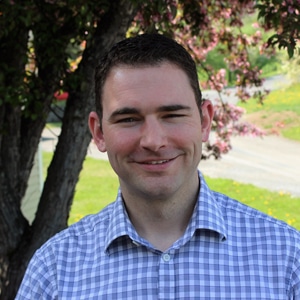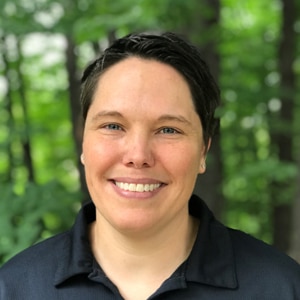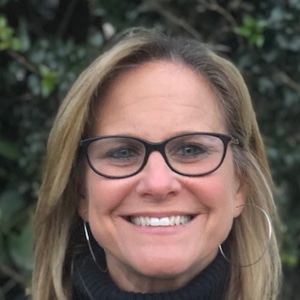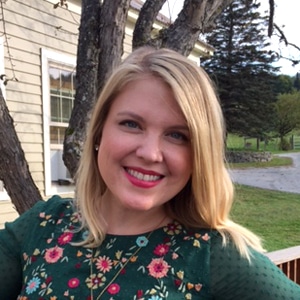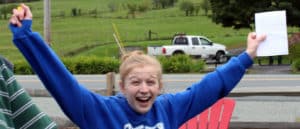This week’s blogger is Liz Edwards, MVTC’s Director of Clinical and Community Outreach for greater New York City. Liz, a Licensed Creative Arts Therapist and Registered Drama Therapist, provides connection and maintains relationships between MVTC and Manhattan and its surrounding communities, and includes the families, educators and mental health professionals who help support our mission.
When I was living in Los Angeles as an actor, I signed myself up for an improv class at Upright Citizens Brigade. As a Musical Theater major in college, I had exposure to improv in the form of warm-up games, but less exposure to longer form improvisation. Naturally, I was terrified. The day of the first class came around, and instead of showing up enthusiastically, I spent a good 10 minutes sitting in my car convincing myself I should go. I was so nervous that I wouldn’t be funny enough, or smart enough, or that I would be judged harshly by others. I’m so happy to report that the experience was the direct opposite of what I feared.
After speaking with Becca Barish, LCSW, the Head of the Wellness Program at Second City in Chicago, I realized that I’m not the only one to feel the anticipatory anxiety, and then a release after participating in improvisation. Becca runs the Improvisation for Anxiety classes at Second City, which falls under the Wellness Program, which also incorporates yoga into their programming. This unique class offers improvisation sessions for adolescents ages 13 to 18 over the course of eight weeks, with one week including their parents at the culmination of the course. A two-hour class includes improvisation with a Second City instructor for the first hour, and then a clinician coming in to take over, offering a CBT-oriented session for the second. Barish shared that she often sees a significant shift in participants over the time they spend in the class. She stated participants often “surprise themselves” with what they can do spontaneously in their last few class sessions.
So why would anyone subject themselves to this kind of an exercise? After all, it is incredibly anxiety-producing, even for professionally trained actors and actresses to get on stage and improvise without a script. Barish shared that there are so many aspects of improvisation that help abate symptoms of Anxiety Disorders, even though it might seem counterintuitive at first. Barish shared that the best part of the class is to see participants relating to each other and breaking down barriers that their disorder may have put up for themselves to avoid their symptoms. When given a playful and most importantly, fun outlet, participants are able to feel that they can relate their experiences to others, particularly those that they may not have known shared their symptoms otherwise. As Barish says, it can be “humanizing to connect with others who make you feel like you aren’t alone,” and may create more ability for interpersonal connection within a disorder that can often be isolating.
In addition to breaking down barriers, improvisation can make treatment for anxiety disorders more fun. The leading forms of treatment for anxiety are Cognitive Behavioral Therapy and Exposure and Response Prevention Therapy, both primary forms of treatment practiced at Mountain Valley. At times, it can be difficult, particularly for teens, to feel motivated to take part in activities that incite anxiety, despite that being the best method to treat it. Through playful games, exercises and improvised role play, participants are not only able to feel more inspired and motivated, but are able to access a more childlike part of themselves. As Barish says, “Exposures are a drag, it’s better for teens to feel like they are playing.” One of the core rules for improvisation is to say “yes, and” to the partners with which one is sharing the stage. This creates an environment where one can never be rejected, and is given unconditional positive regard, which allows the freedom to play. When participants feel safe and trusting of the environment, it sets the stage for more authenticity: something you may be hard-pressed to find in a high school hallway or cafeteria.
Another core principle within improvisation is that the participant does their best not to think too much about what they are doing or saying, but rather to follow their first instincts. Barish noted that this aspect is also helpful to those who suffer from anxiety disorders, as they don’t have as much time to ruminate or obsess over whatever they are going to do or say, but rather they are present in the current moment. Doing versus thinking is a great way to be prepared for real-life situations, where you may have to act spontaneously and make decisions without much time to consider options. These are situations that could produce anxiety for those who suffer from the disorder, but through improvisation, Barish has seen participants grow more confident in being grounded. They are better able to take risks, to tell a joke on the spot, or to lead the group in a warm up—something they previously would not have believed they were able to do.
Ultimately, Barish doesn’t pretend that improvisation is a “cure” for anxiety. She shared that many participants in her class might say things like “I just want it [my anxiety] to go away…” We know from our work at Mountain Valley that there isn’t a magic pill to make anxiety cease to exist for a person, but the more one is able to manage their symptoms and believe that they are more capable than they realize, they have more power over the disorder. And why not receive applause for your work in the meantime?
To learn more about the courses offered for kids and teens at Second City in Chicago, visit their site: https://www.secondcity.com/chicago/find-a-class/lets-get-started/
 I entered Mountain Valley in July of 2016 at 20 years old after realizing I needed a greater level of care in order to learn how to manage the anxiety I had struggled with my whole life. I wanted a fix for my anxiety, but learned that in order to get better, I had to radically accept my anxiety and learn to live with it in a healthy way. I learned that I would still experience anxiety and could use the skills I learned at Mountain Valley to return to college and live in accordance with my values and goals. Over the course of my final year at Villanova, I realized that I wanted to put my mathematical degree to use in the mental health field – and I fantasized about one day working for the place that made such a positive difference in my life.
I entered Mountain Valley in July of 2016 at 20 years old after realizing I needed a greater level of care in order to learn how to manage the anxiety I had struggled with my whole life. I wanted a fix for my anxiety, but learned that in order to get better, I had to radically accept my anxiety and learn to live with it in a healthy way. I learned that I would still experience anxiety and could use the skills I learned at Mountain Valley to return to college and live in accordance with my values and goals. Over the course of my final year at Villanova, I realized that I wanted to put my mathematical degree to use in the mental health field – and I fantasized about one day working for the place that made such a positive difference in my life.

